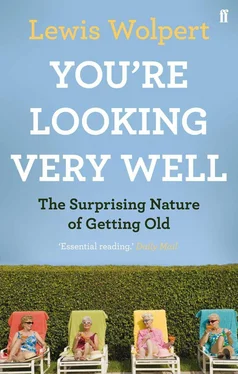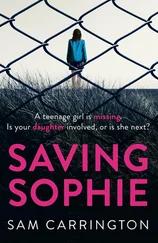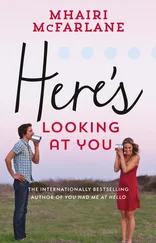Ageing skin is thus thinner, pale, and more translucent. Changes in the connective tissue reduce the skin’s strength and elasticity, especially in sun-exposed areas. It produces the leathery, weather-beaten appearance common to those who spend a large amount of time outdoors. The blood vessels under the skin become more fragile, which in turn leads to easy bruising, but most bruises go away without treatment. The skin glands produce less oil with age and while men experience a minimal decrease, usually after the age of 80, women gradually produce less oil after menopause. This can make it harder to keep the skin moist, resulting in dryness and itchiness. The fat layer, which provides insulation and padding, thins, and this increases the risk of skin injury and reduces the ability to maintain body temperature in cold weather. The sweat glands produce less sweat and this makes it harder to keep cool in hot weather, and so increases the risk of becoming overheated. Growths such as warts and other blemishes are more common. Skin-healing can sometimes fail completely in later life, causing a wound to become chronic. Statistics suggest that at least one in twenty people over the age of 65 have a non-healing skin wound. At particular risk are older people with diabetes, and a distressed emotional state can impair healing even further.
Eye diseases like cataracts, glaucoma and macular degeneration cause loss of vision and are major problems in old age. Cataracts are areas that distort light as it passes through the lens of the eye. As we age, protein in the lens of our eyes can clump together and cloud the lens. Glaucoma is an eye condition in which the fluid pressure mounts inside the eye; this pressure can harm the optic nerve. It is often hereditary and worsens with age. Both cataracts and glaucoma can be treated. Macular degeneration is a disease that causes progressive damage to the central part of the retina that allows us to see fine details. In the USA 30 per cent of patients aged 75 to 85 will have macular degeneration There are genes which increase the risk, and diabetes and high blood pressure also increase the risk of eye problems. There is also presbyopia, the typical ‘long-sightedness’ of middle age, in which people find it more and more difficult to read small print. To begin with they cope by holding the reading material further and further away.
About one-third of Americans between the ages of 65 and 74 have hearing problems and about half the people who are 85 and older have hearing loss. In the UK there are more than 6 million deaf and hard-of-hearing people aged over 60. Tiny hairs inside your ear help you hear as they pick up sound waves and change them into the nerve signals that the brain interprets as sound. Hearing loss occurs when the tiny hairs inside the ear are damaged or die. The hair cells do not regrow, so most hearing loss is permanent. Another type of hearing loss results from damage to other parts of the inner ear. Tinnitus can occur with many forms of hearing loss, including those that sometimes come with ageing. People with tinnitus may hear a ringing or some other noise inside their ears. The good news is that hearing deterioration tends to halt at around the age of 70.
We visit the dentist more as we age. Teeth provide a good model of wear and tear as an ageing process. With age our teeth appear to get darken, due to changes in the dentine beneath the surface enamel. The enamel itself can become worn down from years of chewing, and this causes teeth to become more sensitive. The teeth themselves also become dryer and more brittle, which makes them more likely to break or crack during normal chewing, and old fillings may start to fracture. Gums can start to recede, especially if there is a periodontal disease or they have been subject to too-forceful brushing. Receding gums can increase the risk of tooth decay.
Approximately a quarter of men begin balding by the age of 30 and two-thirds begin balding by age 60. One hypothesis suggests baldness evolved in males as a signal of ageing and social maturity, showing that aggression and risk-taking decrease. This could enhance their ability to raise offspring to adulthood. Most of the hairs on a person’s head are in an active growth phase, which may last anywhere from two to seven years. At the end of this stage the cells causing growth, which are stem cells, die, and the hair falls out. The average scalp contains about 100,000 hairs and roughly 100 hairs are lost every day. Baldness is due to the failure to replace lost hairs and has a genetic basis, but stress can also cause hair loss.
The greying of hair can also occur at quite a young age but commonly begins in the mid-thirties. The blackness of hair is due to special dark-pigment-producing cells, melanocytes, entering the growing hair, and greying is due to their absence or failure to produce dark pigment. For unknown reasons, hair stem cells have a much greater longevity than the melanocyte stem cells, so greying can occur before baldness. Stress hormones may impact the survival and activity of melanocytes, but no clear link has been found between stress and grey hair. Genes can affect both baldness and greying, and twin studies showed that female greying is genetic.
* * *
If all this information sounds depressingly negative, it may be worth remembering ‘The Old Man and the Three Young Men’, a verse fable by La Fontaine, one of the most widely read French poets of the seventeenth century, which gives strength to the old:
An Old Man, planting a tree, was met
By three joyous youths of the village near,
Who cried, ‘It is dotage a tree to set
At your years, sir, for it will not bear,
Unless you reach Methuselah’s age:
To build a tomb were much more sage;’
But all three youths die from accidents.
The Old Sage, then,
Weeping for the three Young Men,
Upon their tomb wrote what I tell.
And in most areas of physical activity, not least sport, there are positive and encouraging examples of physical ability with increasing age. Do those in various sports truly begin an unstoppable physical decline in their twenties, or is this more of a question of reduced motivation? ‘How old would you be if you didn’t know how old you were?’ asked Leroy Paige while playing major league baseball as a pitcher into his late fifties. Ageing is relative—the 60-year-old tennis player may be in better shape than the 20-year-old couch potato. I still regularly play both doubles and singles.
Not long ago it was ‘time to hang it up’ when an athlete hit 40, and one was definitely regarded as being over the hill at 50. Now it’s more like 75. This refers to those who are training and trying to improve their performance, not the average couch-lounger. Some have kept training as they got older, and others have started competing in middle age. One study showed year-to-year performance declining after 50, but at a rate that was barely noticeable until about 75, when the decline became undeniable. Male and female senior athletes’ performance declined approximately about 4 per cent per year over 35 years of competition—slowly from age 50 to 75 and dramatically after 75. The decline in the sprint was greater than in endurance for women, especially after 75. Marathon runners decline about 2 per cent a year between 30 and 40, 8 per cent between 40 and 50, then 13 per cent 50 to 60, and finally there is a 14 per cent decline between 60 and 70. But in 2003 the Canadian long-distance runner Ed Whitlock ran a marathon in under three hours at the age of 73.
There are other amazing exceptions to decline of athletic ability with age. Luciano Acquarone was a marathon world-record holder at 59 years with a time of 2:39, and a 60-year-old runner from Japan who ran it in 2:36. There is a 73-year-old lady who tries to swim, cycle and run three times a week as it makes her feel young and live longer, and she will even enter the Hawaii Ironman triathlon. A great example of strength with age is Ranulph Fiennes, who climbed Everest at the age of 65, and six years earlier ran seven marathons in seven continents on seven successive days. Ruth Frith at 100 set a new world record in her age category with her shot put of just over 4 metres—longer than the throws of competitors decades younger—at the World Masters Games in Sydney in 2009. She trains five days a week, pressing 80lb weights
Читать дальше












